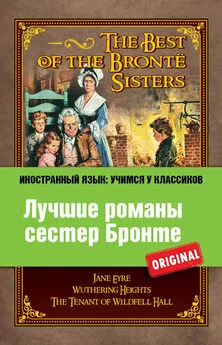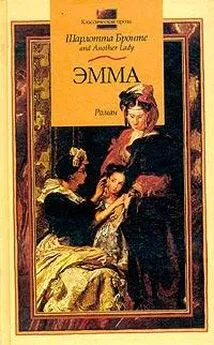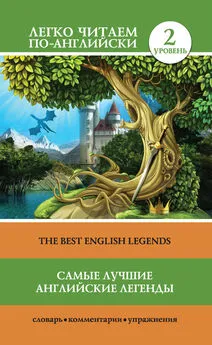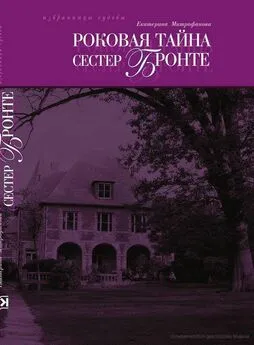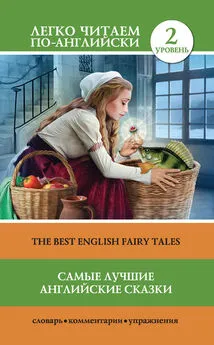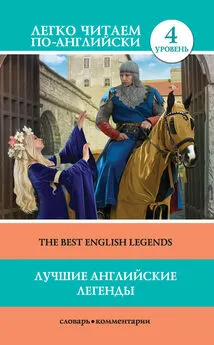Шарлотта Бронте - Лучшие романы сестер Бронте / The best of the Brontë sisters
- Название:Лучшие романы сестер Бронте / The best of the Brontë sisters
- Автор:
- Жанр:
- Издательство:Литагент «Эксмо»334eb225-f845-102a-9d2a-1f07c3bd69d8
- Год:2013
- Город:Москва
- ISBN:978-5-699-61892-7
- Рейтинг:
- Избранное:Добавить в избранное
-
Отзывы:
-
Ваша оценка:
Шарлотта Бронте - Лучшие романы сестер Бронте / The best of the Brontë sisters краткое содержание
«Иностранный язык: учимся у классиков» – это только оригинальные тексты лучших произведений мировой литературы. Эти книги станут эффективным и увлекательным пособием для изучающих иностранный язык на хорошем «продолжающем» и «продвинутом» уровне. Они помогут эффективно расширить словарный запас, подскажут, где и как правильно употреблять устойчивые выражения и грамматические конструкции, просто подарят радость от чтения. В конце книги дана краткая информация о культуроведческих, страноведческих, исторических и географических реалиях описываемого периода, которая поможет лучше ориентироваться в тексте произведения.
Серия «Иностранный язык: учимся у классиков» адресована широкому кругу читателей, хорошо владеющих английским языком и стремящихся к его совершенствованию.
Лучшие романы сестер Бронте / The best of the Brontë sisters - читать онлайн бесплатно ознакомительный отрывок
Интервал:
Закладка:
15
Cuyp-like – as in the pictures of Aelbert Jacobsz Cuyp (1620–1691), Dutch painter
16
references – here: a written testimonial
17
en règle– according to the rules ( French )
18
Wolfe,James (1727–1759) – English soldier who was killed when commanding the British capture of Quebec
19
common – a part of the territory in the centre of some district, belonging to or used by a community as a whole
20
negus – kind of mulled wine
21
Quakerlike – Quakers are members of the Christian group known as the Society of Friends; here: modest and strict.
22
C’est là ma gouverante. –It’s my governess.
23
Mais oui, certainement! –Of course she is!
24
canzonette – a small song ( Italian )
25
La Ligue des Rats: fable de La Fontaine –“The Rats’ Union,” fable by Jean de La Fontaine
26
Qu’ avez vous donc? lui dit un de ces rats; parlez! –So, what do you have? says one of the rats. Speak up!
27
yonder – there ( archaic ). Here and later archaic words are used, such as “bairn” – child, “nought” – nothing, etc.
28
Tyrian-dyed –purple
29
Parian –made of white semitranslucent marble quarried at Páros
30
Hebrew ark – the ark of the Covenant
31
“ after life’s fitful fever they sleep well” –a quotation from “Macbeth” (Act 3, Scene 2) by William Shakespeare
32
Mesdames, vous êtes servies! J’ai bien faim, moi! – Ladies, dinner is served! As for me, I’m terribly hungry!
33
par parenthèse– by the way
34
viz. –that is
35
Revenez bientôt, ma bonne amie, ma chère Mdlle. Jeannette. –Come back soon, my good friend, my dear Miss Jane.
36
It’s a quotation from the poem “Fallen is thy Throne” by Thomas Moore.
37
“Et cela doit signifier qu’il y aura là dedans un cadeau pour moi, et peut-être pour vous aussi, mademoiselle. Monsieur a parlé de vous: il m’a demandé le nom de ma gouvernante, et si elle n’était pas une petite personne, assez mince et un peu pâle. J’ai dit qu’oui: car c’est vrai, n’est-ce pas, mademoiselle?” – It must mean there is a present for me inside, and maybe for you too, Miss. Monsieur has talked about you: he asked me what’s your name and if you are small, thin and somewhat pale. I said yes, because it’s true, isn’t it, Miss?
38
“N’est-ce pas, monsieur, qu’il y a un cadeau pour Mademoiselle Eyre dans votre petit coffre?” – Isn’t there a present for Miss Eyre in your small chest?
39
the men in green – Mr. Rochester refers to Jane as to an imp, a fairy.
40
the likeness of a kingly crown, the shape which shape had none – from “Paradise Lost” by John Milton (1608–1674) where Raphael describes Death to Adam.
41
Latmos – Mount Latmus; according to Greek legends, it was the place where the moon goddess Selene first met Endymion, a mortal who became her lover.
42
petit coffre – a small chest
43
Ma boîte! ma boîte – My box! My box!
44
tiens-toi tranquille, enfant; comprends-tu? – Be quiet, child. Do you understand?
45
Oh ciel! Que c’est beau! – Oh heavens! But it is beautiful!
46
nonnette – a young nun
47
India-rubber ball –meaning natural rubber
48
ditto –the same ( Italian )
49
et j’y tiens – it matters to me
50
Medes and Persians –two tribes mentioned in the Bible
51
Il faut que je l’essaie! et à l’instant même! – I must try it on! Right now!
52
Est-ce que ma robe va bien? et mes souliers? et mes bas? Tenez, je crois que je vais danser! – My frock, does it suit me? And my shoes? And my stockings? Look, I believe I’m going to dance!
53
Monsieur, je vous remercie mille fois de votre bonté; C’est comme cela que maman faisait, n’est-ce pas, monsieur? – Monsieur, I thank you thousand times for you generosity. That’s like my mom used to do, isn’t it, Monsieur?
54
comme cela – like that
55
taille d’athlète – athletic built
56
croquant – crunching
57
porte cochère – gateway
58
Job’s leviathan broke the spear, the dart, and the habergeon – allusion to the Bible (the Book of Job, 41:26). Here is meant the readiness to overcome any hardships and obstacles.
59
roué – a scapegrace
60
beauté mâle – man’s beauty, handsomness
61
filette – a daughter or a girl
62
Beulah – from the Bible: a symbolic name of the heavenly Zion, the promised land.
63
Qu’ avez-vous, mademoiselle? Vos doigts tremblent comme la feuille, et vos joues sont rouges: mais, rouges comme des cerises. – What’s happened, Miss? Your fingers are trembling like a leaf, and your cheeks are red, as red as cherries.
64
ignis-fatus – “fool’s fire” ( Latin ), dim wandering light appearing over the swamps at night. It is believed to drive travellers from the safe paths.
65
passées – old-fashioned
66
Some natural tears she shed – allusion to “Paradise Lost” by John Milton (1608–1674); the original quote is “Some natural tears they dropped.”
67
Elles changent de toilettes – They change.
68
Chez maman, quand il y avait du monde, je le suivais partout, au salon et à leurs chambres; souvent je regardais les femmes de chambre coiffer et habiller les dames, et c’était si amusant: comme cela on apprend. – When my mom had guests, I followed them everywhere, in the drawing room and in the bedrooms. I often watched the maids combing and dressing the ladies, and that was real fun; that’s how they learn.
69
Mais oui, mademoiselle: voilà cinq ou six heures que nous n’avons pas mangé. – Oh yes, Miss; it is really five or six hours since we had some food.
70
abigails –allusion to the Bible, here: ladies’ maids
71
et alors quel dommage – well, it’s a pity
72
Est-ce que je ne puis pas prendre une seule de ces fleurs magnifiques, mademoiselle? Seulement pour completer ma toilette. – Oh Miss, can’t I take one of these beautiful flowers? Just to complete my toilette.
73
minois chiffoné – here: pretty
74
père noble de théâtre – noble (aristocratic) head of the family, father (theater emploi)
75
Tant pis! – even worse! (meaning “it serves her right”)
76
Au reste – as for the rest of it
77
Who would not be the Rizzio of so divine a Mary – an allusion to the story of David Rizzio, a private secretary of Mary Stuart, Queen of Scots (1542–1587)
78
black Bothwell – the husband of the said Mary who mastered the murder of Rizzio
79
con spirito – here: in a high-spirited way ( Italian )
80
Gardez-vous en bien – Look out!
81
Paynim – Muslim or pagan
82
airs – here: songs
83
Voilà, Monsieur Rochester, qui revient ! – Here is Mr. Rochester, he’s come back!
84
Mother Bunches – a person from the English folklore, a wise old countrywoman, teaching a mixture of charms and magical recipes
85
le cas – the proper case
86
the old gentleman – the devil
87
ad infinitum – eternally ( Latin )
88
Queen Boadicea – a British Celtic warrior queen who led an uprising against Roman occupation.
89
prête à croquer sa petite maman Anglaise – ready to eat her English mommy up
90
Midsummer – a religious holiday celebrated on the 24 thof June
91
Day its fervid fires had wasted – it is a slightly changed quotation from Thomas Campbell’s “The Turkish Lady.” The original phrase was “Day her sultry fires had wasted.”
92
organ of Adhesiveness – according to Phrenology (a science of faculty psychology and theory of brain), each faculty must have a separate seat or “organ” in the brain
93
gild refined gold – it is a quotation from William Shakespeare’s “King John,” meaning “to improve something unnecessarily.”
94
King Ahasuerus – Persian king (better known as Xerxes I), famous for his riches and splendor
Читать дальшеИнтервал:
Закладка:
